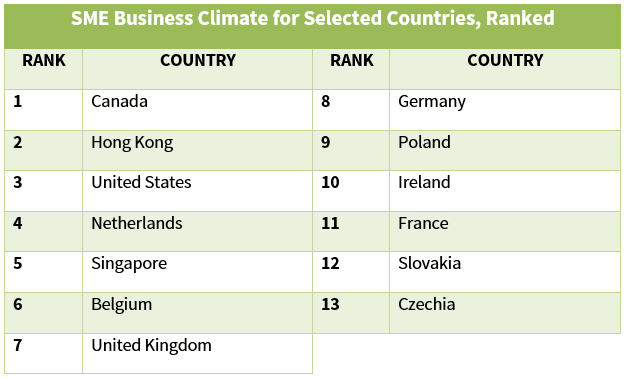Research Finds that SMEs in Canada Enjoy the Best Business Climate

Canada provides the optimal environment for small and medium-sized enterprises (SMEs)—better than any country in the world, according to a recent study.
Business Climate: Which Country is the Best in Class for SMEs?, authored by trade credit insurance company Euler Hermes, finds that Canada provides the best climate for SMEs, due to a reasonably flexible labour market, a low level of red tape, favourable tax policies, good financing conditions, and low competition. The other countries rounding out the top five are Hong Kong, the US, the Netherlands, and Singapore.

The findings on business climate are crucial for Canada, where 99% of companies are SMEs. According to Canada’s State of Trade report, in 2017 there were approximately 1.2 million SMEs in Canada, responsible for 89% of private sector jobs. These numbers are even higher than the global statistics, where SMEs represent 95% of all firms and account for only 60% of employment.
Advantages for SMEs in Canada
The report outlines some of the advantages in the business climate in Canada that make it the top location for SMEs:
- Corporate Tax Rates: While Canada’s base tax rate is 28%, the rate for SMEs is only 9%, compared to the global average of 23%. Canada ranks number one in this category, followed by France and Poland.
- Financing: The report observes that the Canada Small Business Financing Program provides loans of up to $1M for business expansion activities at competitive interest rates, and Export Development Canada offers low-interest loans and additional supports for small businesses.
While the report does not cover other forms of financing, SMEs also have access to a wide variety of Canadian government funding for small businesses to support activities related to expansion, capital and tech adoption, hiring and training, and research and development.
- Competition: SMEs in Canada face lower competition than those in many other countries. Canada ranks third in the study in relation to competition. By comparison, the US ranks 11th and Germany ranks the lowest at 13th.
The study also compares the climate for SMEs to the overall business climate, and finds that companies in Canada, the US, the Netherlands, and Belgium face fewer constraints than an average company in these locations.
Needed Improvements in the Business Climate in Canada
Trade Diversification Challenges
In addition to highlighting the advantages for SMEs in Canada, the report also pinpoints areas for improvement. The primary challenge is a need for export diversification: SMEs in Canada are overly reliant on the US market, with 80% of their exports going to this major trading partner. It’s also troubling that only 12% of Canadian SMEs export at all.
This need for diversification seems to be a priority for the Government of Canada. Building international relations and trade has been a key aspect of Prime Minister Trudeau’s foreign policy. The issue was also highlighted in Canada’s State of Trade 2019, which recommended additional government funding programs to help more SMEs export, and export outside of the US: “Encouraging SMEs to export could help Canada realize its 2025 goal of increasing overseas exports by 50%.”
Global trade has shifted as a whole due to COVID-19, but trade is expected to rebound as the world recovers from the ongoing pandemic.
Trade Diversification Strategies & Canadian Government Funding
To help address these challenges, the federal government’s CanExport program offers business expansion support through a special stream for SMEs. CanExport drives increased exporting for SMEs and provides up to 75% coverage of eligible export project costs, to a maximum of $75K. Additionally, Canada’s Regional Development Agencies offer funding through the Business Scale Up & Productivity Program for businesses looking to adopt new technologies and enter or grow in global markets. Funding amounts vary by region.
Finally, the Canada-European Comprehensive Economic and Trade Agreement (CETA), once fully ratified, will open 27 markets and over 500 million consumers to Canadian exports through tariff-free trade. Canadian SMEs will benefit through reduced technical barriers, enhanced market access for service industries, simplified procedures for clearing goods through customs, and other improvements in accessing international trade.
Find Government Grants to Help Your Business Export
The Canadian government offers a wide variety of federal and provincial government grants, even during COVID-19. Learn more about programs such as CanExport, which provides grants of up to $75,000 towards exporting and marketing activities, and other ongoing business expansion programs.
Download your free Canadian Guide to Export Expansion white paper to learn how you can match your business’ growth activities with available government funding programs. This guide was recently updated for 2020.
Disclaimer: This blog was written before the COVID-19 pandemic and may feature some information that is no longer accurate.
